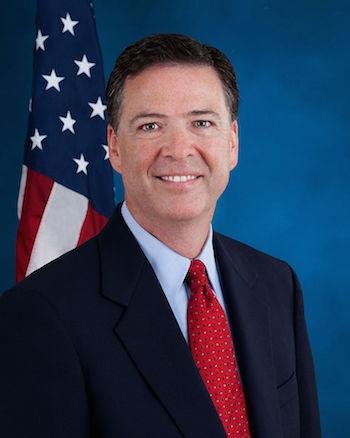FBI Director at G.U.: Don’t Let Police Off the Hook
By • February 26, 2015 0 825

“I’m not willing to let law enforcement off the hook,” FBI Director James B. Comey said in a Feb. 12 speech about policing and race Thursday at Georgetown University’s Gaston Hall. The speech marked the first time an FBI director has spoken on the topic and comes on the heals of nationwide unrest spurred by the deaths of Michael Brown, Eric Garner, Tamir Rice and others who were killed at the hands of police officers.
In addition to race, Comey touched on technology, community policing and trust as areas that police needed to improve upon, but he also argued that most police officers are “good people” who are “overwhelmingly doing the right thing and making the right choices.” He also highlighted his “affection” for law enforcement.
On the increased militarization of police forces, Comey argued, “It’s not the stuff [the equipment]. It’s about the training and the discipline and how we use it.” He asked rhetorically, “Do we use that stuff to confront people who are protesting in a crowd? Do we use a sniper rifle to see closer in a crowd?”
In a strong condemnation of how police report law-enforcement-involved deaths, Comey said it was “ridiculous” that such deaths are harder to find information on than “how many people went to the emergency room with fly symptoms last week.” He said it is impossible to “understand or address these issues” without more data and details on how police shooting incidents occur. Comey critiqued the current system of voluntary reporting in such incidents and said, “Without complete or accurate data, we are left with ideological thunderbolts.”
Speaking on Abraham Lincoln’s birthday, Comey harked back to the nation’s history of slavery and law enforcement’s “complicity” in that history, calling it “our inheritance as law enforcement.” He said the “mental shortcut” of assuming “everyone lies and everyone is guilty” is “easy but… false,” yet “irresistible.” He went on to say that if law enforcement can’t change their “latent biases” they can at least change their “behavior in response to those instinctive reactions.”
Comey implied that fixing the ways police use technology and react to minorities will help law enforcement regain the trust of the American people. He called the current lack of trust in minority communities “corrosive” to the “entire justice system.”
However, Comey also took swings at law enforcement’s critics, saying that broader societal problems lead poor kids to “inherit a life of crime” and that body cameras will not solve “a host of problems” in the criminal justice system.
Comey closed out his remarks on a conciliatory note, quoting Martin Luther King Jr. in saying, “We must learn to live as brothers or we will perish together as fools,” adding, “Relationships are hard. Relationships require work. So let’s begin that work. It is time to start seeing each other as who we really are.”

